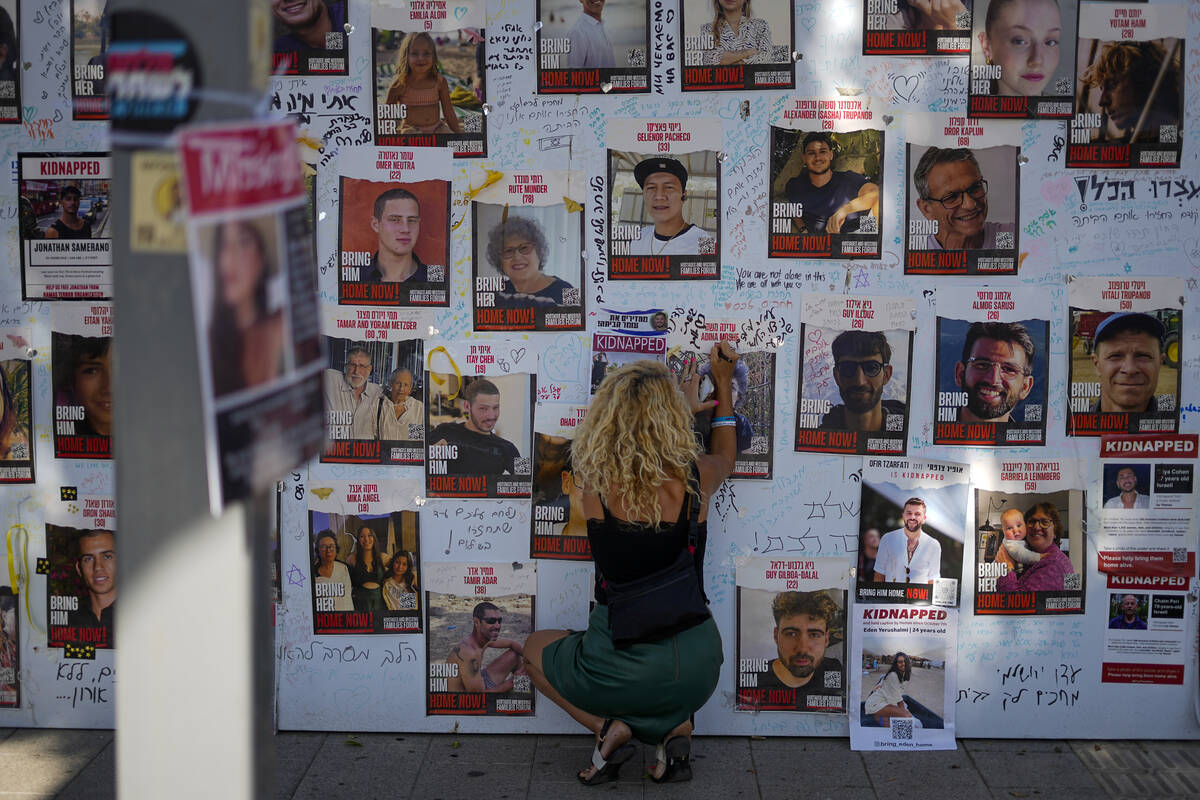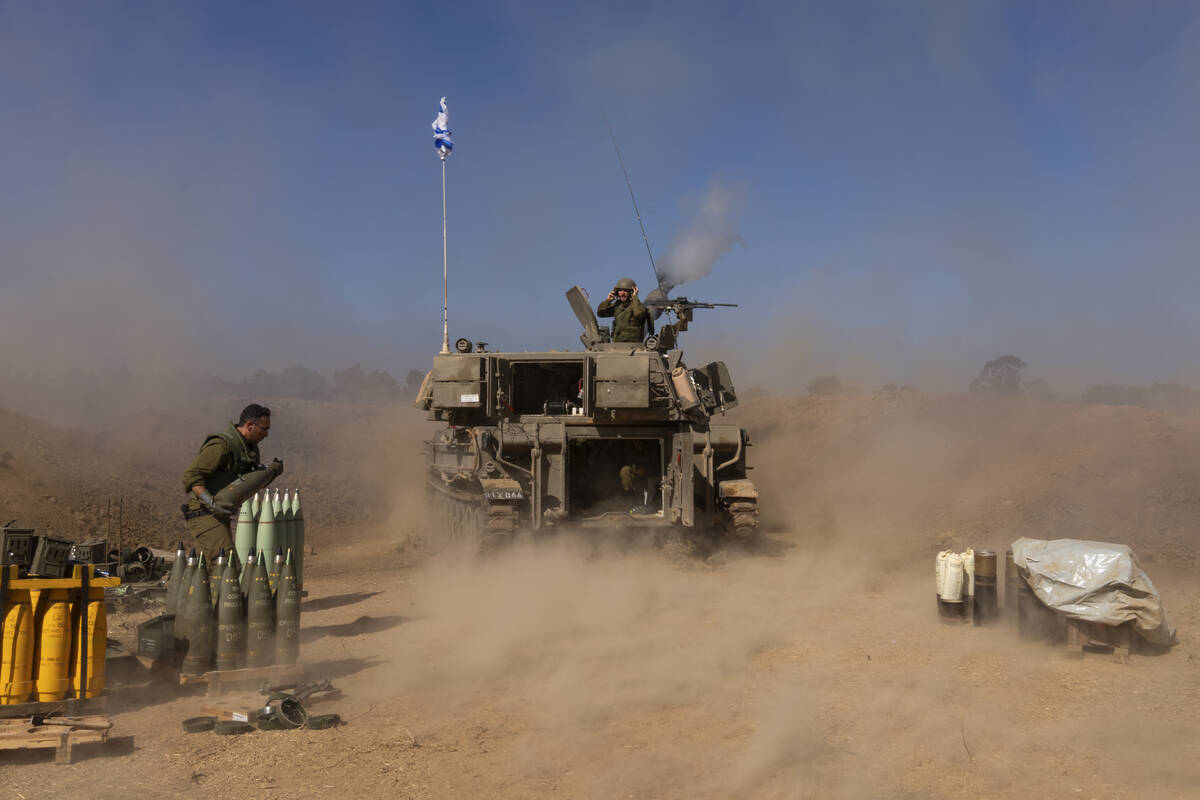Netanyahu: Israel will control security in Gaza indefinitely
KHAN YOUNIS, Gaza Strip — Israel said Tuesday that its ground forces were battling Hamas terrorists deep inside Gaza’s largest city, signaling a major new stage in the month-old conflict, and its leaders foresee controlling the enclave’s security after the war.
The push into Gaza City guarantees that the death toll will rise further, while comments from Prime Minister Benjamin Netanyahu about providing Gaza’s security for “an indefinite period” pointed to the uncertain endgame of a war that Israel says will be long and difficult.
Israeli ground troops have battled Palestinian terrorists inside Gaza for over a week, cutting the territory in half and encircling Gaza City. The army’s chief spokesman, Rear Adm. Daniel Hagari, said that Israeli ground forces “are located right now in a ground operation in the depths of Gaza City and putting great pressure on Hamas.”
Hamas spokesman Ghazi Hamad, speaking on Tuesday from Beirut, denied that Israeli forces were making any significant military gains or that they had advanced deep into Gaza City.
Hamad left Gaza days before Hamas’ Oct. 7 terrorist rampage in southern Israel, which sparked the war.
The Associated Press could not independently verify the claims of either side.
Israelis commemorated the 30th day — a milestone in Jewish mourning — since the Hamas terrorist incursion, which killed more than 1,400 people. About 240 people abducted by Hamas terrorists during the attack remain in Gaza, and more than 250,000 Israelis have evacuated homes near the borders of Gaza and Lebanon amid continuous rockets fired into Israel.
A month of bombardment in Gaza has killed more than 10,300 Palestinians, according to the Health Ministry of the Hamas-run territory.
Around 70 percent of Gaza’s 2.3 million people have fled their homes, and many of them are crowded into U.N. schools-turned-shelters.
Hundreds of thousands have heeded Israeli orders to head to the southern part of Gaza, out of the ground assault’s path. Others are afraid to do so because Israeli troops control part of the north-south route. Bombardment of the south has also continued.
Israel says it targets Hamas fighters and infrastructure and accuses the group of endangering civilians by operating among them.
Options for ‘Day After Hamas’
Israel has vowed to remove Hamas from power and crush its military capabilities — but neither Israel nor its main ally, the United States, has said what would come next.
Netanyahu told ABC News that Gaza should be governed by “those who don’t want to continue the way of Hamas,” without elaborating.
“I think Israel will, for an indefinite period, will have the overall security responsibility because we’ve seen what happens when we don’t have it. When we don’t have that security responsibility, what we have is the eruption of Hamas terror on a scale that we couldn’t imagine,” he said.
Netanyahu did not make clear what shape that security control would take. The White House on Tuesday reiterated that President Joe Biden does not support an Israeli reoccupation of the Gaza Strip after the war.
“We do think that there needs to be a healthy set of conversations about what post-conflict Gaza looks like and what governance looks like,” said White House National Security Council spokesman John Kirby, adding that he would leave it to Netanyahu to clarify what he means by “indefinite.”
Israeli officials say the offensive against Hamas will last for some time and acknowledge that they have not yet formulated a concrete plan for what comes after the war.
The defense minister has said Israel does not seek a long-term reoccupation of Gaza but predicted a lengthy phase of low-intensity fighting against “pockets of resistance.” Other officials have spoken about establishing a buffer zone that would keep Palestinians away from the Israeli border.
“There are a number of options being discussed for The Day After Hamas,” said Ophir Falk, a senior adviser to Netanyahu. “The common denominator of all the plans is that 1) there is no Hamas 2) that Gaza is demilitarized 3) Gaza is deradicalized.”
No cease-fire in sight
Israel withdrew troops and settlers in 2005 but kept control over Gaza’s airspace, coastline, population registry and border crossings, excepting one into Egypt.
Hamas seized power from forces loyal to President Mahmoud Abbas in 2007, confining his Palestinian Authority to parts of the occupied West Bank.
Since then, Israel and Egypt have imposed a blockade on Gaza to varying degrees.
In his ABC interview, Netanyahu also expressed openness for the first time to “little pauses” in the fighting to facilitate delivery of aid to Gaza or the release of hostages. But he ruled out any general cease-fire without the release of all the hostages.
For now, Israel’s troops are focused on northern Gaza, including Gaza City, which before the war was home to about 650,000 people. Israel says Hamas has extensive terrorist infrastructure within residential areas, including a vast tunnel network.
The military says it has killed thousands of Hamas fighters. The Gaza Health Ministry’s death toll does not distinguish between civilians and combatants — and slain fighters not brought to hospitals would not be in its count.
Israel says 30 of its soldiers have been killed in Gaza since the ground offensive began.
Residents in northern Gaza reported heavy battles overnight into Tuesday morning on the outskirts of Gaza City.



















